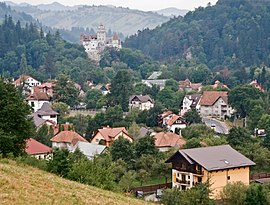Bran, Brașov
Commune in Brașov, Romania From Wikipedia, the free encyclopedia
Commune in Brașov, Romania From Wikipedia, the free encyclopedia
Bran (German: Törzburg; Hungarian: Törcsvár) is a commune in Brașov County, Transylvania, Romania. It is about 25 kilometres (16 mi) southwest of the city of Brașov and consists of five villages: Bran, Poarta (Hungarian: Porta), Predeluț (Kispredeál), Șimon (Simon), and Sohodol (Szohodol).
Bran | |
|---|---|
 | |
 Location of Bran within Brașov County | |
| Coordinates: 45°30′41″N 25°21′51″E | |
| Country | Romania |
| County | Brașov |
| Government | |
| • Mayor (2020–2024) | Cosmin Feroiu[1] (PNL) |
| Area | 67.85 km2 (26.20 sq mi) |
| Elevation | 720 m (2,360 ft) |
| Population (2021-12-01)[2] | 4,866 |
| • Density | 72/km2 (190/sq mi) |
| Time zone | EET/EEST (UTC+2/+3) |
| Postal code | 507025 |
| Area code | (+40) 02 68 |
| Vehicle reg. | BV |
| Website | primariabran |
The medieval Bran Castle is a popular tourist destination, partly because it is associated with the home of Dracula in Bram Stoker's novel of the same name;[3] the castle has been listed as one of the Seven Wonders of Romania.
Bran is located in the southern part of Brașov County, on or near the border with Dâmbovița and Argeș counties, and belongs to the historical sub-region of Țara Bârsei (Burzenland). It lies at the northern end of the Rucăr-Bran Pass; national road DN73, which runs through the pass, connects Brașov to Pitești, 111 km (69 mi) to the southwest.
The commune is situated between two mountain ranges of the Southern Carpathians: to the southeast are the Bucegi Mountains, with the Omu Peak dominating the area, at 2,505 m (8,219 ft); and to the west are the Piatra Craiului Mountains, which top out at 2,238 m (7,343 ft).
The Teutonic Order began building a wooden fort called Dietrichstein here early in the 13th century. After the fort's destruction in 1242 by Mongols ("Tatars"), King Sigismund of Hungary ordered a stone castle to be built in 1377, while the settlement of Bran began to develop nearby. Positioned high atop a steep cliff, the castle guarded a strategic trade route between Transylvania and Wallachia. In 1498, Bran came under the jurisdiction of Brașov.[4]
After the Ottoman Empire defeated the Kingdom of Hungary in the 16th century, Bran became part of the Eastern Hungarian Kingdom and the Principality of Transylvania, which eventually became part of the Habsburg monarchy. In 1804 the commune became part of the Austrian Empire along with the Grand Principality of Transylvania, and in 1867 the Hungarian section of the Austro-Hungarian Empire. It became part of the Kingdom of Romania following World War I.[5]
After Transylvania became part of Romania, Bran Castle (that was owned by the city of Brașov) was gifted to Queen Marie by the Brașov magistrate. The queen transformed it into a royal residence in the 1920s, and today it is one of Romania's most popular visitor sites. It is open to tourists, who can view the inside alone or as part of a guided tour. Outside the castle is an open-air museum with traditional Romanian farm houses and manufacturing facilities.
| Year | Pop. | ±% |
|---|---|---|
| 1850 | 3,896 | — |
| 1930 | 4,737 | +21.6% |
| 1977 | 6,029 | +27.3% |
| 2002 | 5,292 | −12.2% |
| 2011 | 5,181 | −2.1% |
| 2021 | 4,866 | −6.1% |
| Source: Census data | ||
Seamless Wikipedia browsing. On steroids.
Every time you click a link to Wikipedia, Wiktionary or Wikiquote in your browser's search results, it will show the modern Wikiwand interface.
Wikiwand extension is a five stars, simple, with minimum permission required to keep your browsing private, safe and transparent.